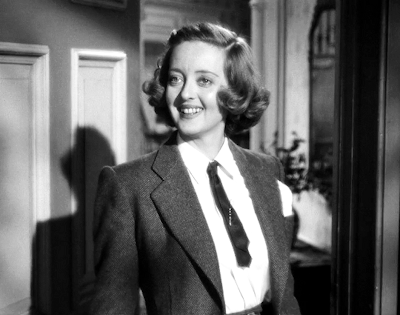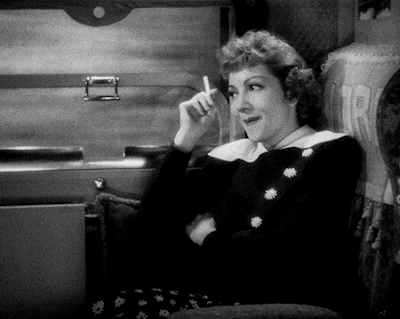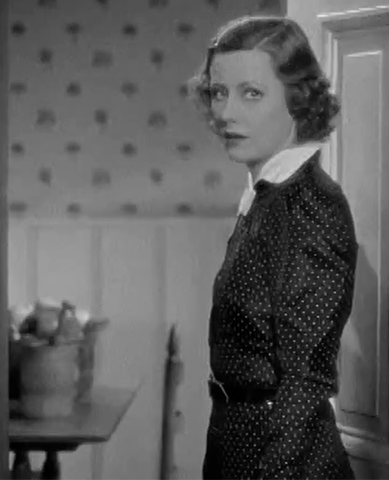The Agony Aunties of Old Hollywood
You know, whenever I find myself in need of guidance, I often think to myself, jeez, I really wish I could write a letter to Bette Davis right about now and get her divine counsel.
And then I remember that I can’t do that, but really,
my mother’s advice is probably much more sound anyways.
But for a year in the early ‘40s, you could, theoretically,
write a letter to Bette Davis—with the deepest personal questions plaguing
you—and get a response in the pages of Photoplay.
Bette Davis’s advice column, ‘What Should I Do?’, premiered in
the December 1942 issue of Photoplay with the following promise from the
Editors: “Believing that there is great need for wise counsel in this
troubled world, Photoplay-Movie Mirror has persuaded Bette Davis, the
woman who is Hollywood's famous advice star, to act as consultant to its
readers. So every month Miss Davis will study the letters you send her and give
her answers on these pages.”
Bette added: “In answering these letters I am not seeking
to set down hard and fast rules of conduct. I am merely giving my own personal
opinion as to the course I would follow, were I in the position described by
the letter-writer. Of course, since I don’t know the actual persons involved,
and since I know that circumstances always alter cases, under these conditions
my advice must not be considered authoritative in any instance.”
Some of the questions Bette answered in her column are just…
they should have inspired movies or radio serials, honestly. Or teenage
melodramas, since so many teenagers wanted Bette’s advice on love and dating—and
their teenage, wartime marriages…
In the August 1943 issue, there’s a letter from a 17-year-old
who married an older man and found out she doesn’t actually love him. The only
problem is that this man has threatened suicide if she leaves. Bette’s advice
is sound, though couched with the morals of the ‘40s: be honest with him, leave,
and (the out-dated part) why did you bother marry him and be so dishonest in
the first place?
In October, she answered the letter of a 17-year-old who fell
in love with a married 39-year-old doctor
and wanted advice on making the first move so that he’d know she was receptive
to romance.
Bette, thankfully, replied: “I am sure, if you told this
man how you felt, you would always regret it. It would be in extremely bad tase
for you to bring up the question of his attitude for you; when a man of his age
has anything he wishes to say to you, rest assured that he will say it, so wait
for that time to come.”
There’s also a letter writer who—no joke—just wants to buy the
fur coat Bette wore in The Bride Came C.O.D and cloaks it in a question
about kissing boys.
Bette very tersely writes that the wardrobe department owns
the costumes, and there’s a post-script at the bottom of the article: “In
closing. Miss Davis has this to add: ‘For the information of those who write in
asking to purchase discarded items of my personal wardrobe, perfume bottles, or
other items for a collection, I turn over all my personal toss-outs to the
Hollywood Guild, 1284 North Crescent Heights Boulevard, Hollywood. The Guild,
in turn, sells the material at a nominal figure and the money so collected is
used to help distressed theatrical people living in this district.’”
Give me a time machine and an oversized bag of money, and I’ll
make good use of it, I promise…
What I appreciate about Bette’s (and likely, her ghostwriter’s)
approach to advice is that it’s so characteristically Bette Davis. The woman
walked through life with strong opinions and the confidence to dole them out,
and her advice is the same.
For all the lovelorn teenagers in love with older men—was
there nothing else to do in wartime?—Bette is direct but frames the advice in
such a way that (I hope) the teens reading them had an, “Oh yes, she makes a
great point,” and not a, “Screw Bette Davis, I’m going to do what I want!”
Side note: I would love it if someone who wrote in to Bette
ever made it publicly known that she had. Imagine that being your six degrees
of separation: Bette Davis told me not to tell the married, inappropriate
doctor that I’m in love with him! (And I listened, or didn’t, to her advice!)
Alas, Bette’s advice column only lasted the year, and by
January 1944, her friend Claudette Colbert stepped in to fill the void.
Her letters were answered with help from Fredda Dudley, a Photoplay
employee, and her first column came with the caveat that, if you were a
teenager in need of advice on propositioning an older man and you’d already written
to Bette, “Any letters which Miss Davis was unable to answer before
discontinuing her column received Miss Colbert’s immediate personal attention.”
Claudette wrote “I shall do my very best to be of aid to
anyone who has a problem, large or small, and I hope that my efforts will be in
keeping with the high standards that have been maintained by my predecessor,
Bette Davis.”
One of her first letters is from 23-year-old Kathryn S., and
it’s another movie-worthy doozy: Kathryn is in love with a 48-year-old widower
with adult children close to her age. She works for the family in a housekeeper
capacity, the family treats her in a very upstairs/downstairs manner, and she’s
also had a child by him. The adult children say they’ll move out if she marries
their father; if she tries to leave, the widower says he’ll keep the baby away
from her.
(Didn’t Loretta Young make that movie? That could be Private
Number crossed with like, Jane Eyre…)
Anyways, here’s Claudette’s advice: “If you are desperately in love with this man and he will marry you, I don’t think you should worry too much about the attitude of his older children. Since you are twenty-three and you say the children are near your own age, it is likely that the boy will soon be in the Army and the girl may marry, so they would shortly leave the family circle anyway.”
She also says that she doesn’t believe the widower ever had
any intention of marrying her, so stay or go, just be happy either way.
From flipping through a few issues, it’s clear that Claudette also
liked answering questions from teens hellbent on getting married. The advice
was almost always an emphatic, “DON’T DO IT!” and when called out once, she
said it’s because teenagers aren’t mature enough emotionally to be married.
A letter from the February 1950 issue is from a 20-year-old
named Jessie C. who married at 16 and now has two kids, a husband who works all
day and then goes out with the boys all night, and she’s plum exhausted.
Claudette’s general advice: “I always recommend that a girl finish school
and work a few years before marrying. Every girl is entitled to a few years of
fun and freedom before she assumes the obligations of family life.”
Her advice to Jessie C.: “You should see your doctor at
once. He should take steps to improve your general physical condition so that
you won’t be so tired. Next, you should make arrangements for a babysitter at
least once a week.
“Finally, you must realize that the important
things in this world are not inanimate objects like rugs, sofas and other items
of furniture, but human beings and the relationships between them. You love
your husband, so you must love to have him comfortable. There will be dust and
ashes in the world, scattered far and wide, long after we, ourselves, are dust
and ashes Don’t worry about them.”
If nothing else, it’s fascinating to see how gender dynamics
and societal roles have changed in the decades since these advice columns were
popular. How many people would get married at 16 and let their husband walk all
over them? Surely not as many as in the past.
Another letter from August 1951 is interesting because it’s
from a teenager inquiring about plastic surgery…
Brownie T’s letter, in its entirety, reads: “I am sixteen and
am rather attractive because I have green eyes and blonde hair and what is said
to be a pretty mouth. But I have an extremely large nose with a hump on it. It spoils
me completely.
Occasionally I have read stories in the movie magazines
about actresses who have undergone plastic surgery, but whenever I have written
to these actresses for the names of the doctors who performed the surgery, I
have received no reply. I would like to secure the names of some good plastic surgeons
and their addresses. I would also like to know how much such an operation costs.
Because you are married to a doctor and because you
seem to take an interest in people with worries, I am writing to you. Can you supply
the answers?”
The answer, according to Claudette, isn’t that plastic surgery
doesn’t happen in Hollywood, and at least she’s honest about it. And that’s not
a condemnation on what she did or didn’t have done herself, since that wouldn’t
bother me; I just like the acknowledgement that yes, some of those features are
enhanced.
Claudette’s answer is that it’s not ethical to share the names
of plastic surgeons as it’s a form of advertising, “and from such publicity an ethical
surgeon shrinks.” She’d hate those shows on E!...
But she tells Brownie that there are good plastic surgeons all
over the country, and to consult with her family doctor to find one. “As to cost,
this varies according to the type of work which must be done.”
You almost wish that she’d tell a 16-year-old that she might
grow into her nose or that the bump isn’t as magnified as she thinks it is, but
then, those were the times. I think attitudes towards plastic surgery have
changed, too. There’s nothing I’d want to alter on my face but if, say, my nose
was bothering me and plastic surgery could improve my confidence, why not?
Claudette carried on with her advice column until April 1953
and ‘What Should I Do?’ disappeared for a few years. It was revived again,
briefly, by Spring Byington from April to December 1956, who was starring in
the television series December Bride at the time.
In her brief tenure as agony auntie, Spring gave absolutely
bananas advice to this question from Helene J: “I’m the sort of person who
would not, normally, think of writing to a stranger for help, but I’m faced
with a problem too painful to confide to anyone related to me. Perhaps you will
have an idea to ‘save me’; perhaps not. It may be ‘just one of those crazy
things,’ but I think it’s worth the gamble.
“A few days ago, I received a special delivery-air
mail letter from a former college chum who said she would like to wring my neck
because I hadn’t responded when she called to me as she was arriving at The
Shamrock Hotel in Houston, and my husband and I were leaving. ‘When did you
tint your hair?’ she wanted to know. ‘Very becoming, but I might not have
recognized you if it hadn’t been for that celebrated alligator suitcase you carried
to and fro during our college days. It still has its Hotel Splendide sticker
pasted on it, I notice.’ She went on to say that she had hesitated to call to
me until she caught sight of George, my husband, then we drove away before she
had time to catch up to us.
“Jane has always had the eyes of a young hawk, but
she is also a conclusion jumper.
“I might have dismissed the whole thing as a case
of mistaken identity, except that my husband was in Houston at the time she
mentioned, and on this trip he did take my alligator case because his
two-suiter couldn't accommodate all the things he felt he might need” tuxedo
equipment, for example.
“George is not yet home from this western trip,
the first he has made in two years, and the first without me. I couldn’t go
this time because Chon, our seven-year-old, had a bad case of measles and I
didn’t want to leave him.
“We have been married nine years, have three
lovely children, a wonderful new home, and I considered our life ideal. But
what about that woman, who was obviously traveling as George’s wife?
“Tell me, Miss Byington, does a wife end her
marriage because of a thing like that? And if she doesn’t what does she do? I
do hope you can help me.”
And here’s Spring’s reply, well, the bananas part, anyways: “Probably
the most important fact to you at this time is that your husband undoubtedly
loves you dearly. At least, his defection does not mean that he doesn’t love
you. You would learn soon enough if he wanted his freedom.
“So many odd things happen in this world that none
of us ever dares jump to a conclusion. Why not wait for a while, being as
natural and as much like your usual self as possible in the meantime, to see if
your husband doesn’t come up with a report about his business trip that may
explain everything.
“Frankly, I’m interested enough in your story to
want to know what happens next.
“I’m hoping to hear from you — and with good
news.”
By the time Spring took over the column, she was in her 70s. That’s
the excuse I’m assigning her, anyways. It’s the type of advice you’d expect
from someone born in the 1880s.
After Spring’s tenure ended, “What Should I Do?” was permanently
retired. Other movie mags tried their hand at advice, too, it wasn’t just a Photoplay
phenomena. Irene Dunne wrote a column in Silver Screen called “What is YOUR
Problem?” from February 1947 to March 1952.
Aside from the hostile name, Irene’s column promised “honest
down-to-earth advice” from the sympathetic actress. And boy, is she right.
In the April 1951 issue, she answers a letter from a housewife
whose husband “goes out with girls, admits having affairs with them and seems
to enjoy telling me about it and seeing how much it hurts me.”
The letter goes on about how she stays home to care for their
children, has barely enough money to buy groceries with what her husband spends
on himself, her sister is paying for her nephew, and her husband is calling
her crazy when she brings all this up.
Irene’s ‘honest down-to-earth’ advice? Blame the wife. She writes:
“First of all, stop being suck a mouse and assert yourself! Why don't you go
any where? You should! It's possible, you know, that you've made yourself such
a stick-in-the-mud that you're indirectly responsible for your husband straying
from home. If he has so muck money to spend, his credit must be good enough for
you to open some charge accounts. Why don't you, and without going wild buy
some clothes for yourself and. your child? Next, you can appeal to your
husband's pride. I'm sure he doesn't enjoy seeing you look shabby, nor would he
want your son to, if he feels that as his wife and child you represent him. He
wouldn't want to be ashamed of you! Third, if he continues to refuse to listen
to you, isn't there someone else whose opinion he respects who could talk to
him and convince him that he is being completely selfish and defaulting in his
obligations; that he is a bad husband and father—and really quite a heel? What
about your doctor or pastor or some close friend or relative? I think you arc
being treated very shabbily and I sympathize with you, but I do feel you must
assert yourself more.”
Honestly, I think ‘Theodora’ should have stuck to the
scandalous romance novels instead of trying her hand at advice, because that’s
unhinged…
Anyways, reading all of these ‘agony auntie’ columns got me
thinking: which modern Hollywood actresses would give great advice? I think
there are a lot of right answers, but one is particularly more right than any
other suggestion you might drop in the comments, and that’s Dame Emma Thompson.
I bet Meryl Streep has seen and done just about everything; her advice would be solid. Oh, and Viola Davis! Viola would shoot straight—her autobiography, Finding Me, is so good!
Who do you think would make a great advice columnist? And what do you think of Bette, Claudette, Spring and Irene attempting it? Let me know in the comments!







Comments
Post a Comment